Related Research Articles
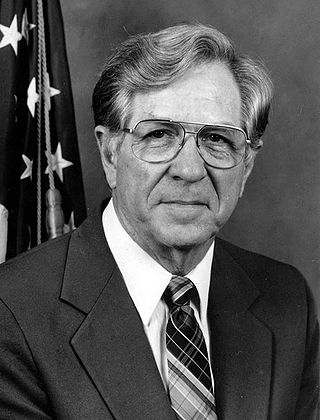
Neal Edward Smith was an American politician who was a member of the United States House of Representatives for the Democratic Party from Iowa from 1959 until 1995, the longest-serving Iowan in the United States House of Representatives.

The Des Moines Register is the daily morning newspaper of Des Moines, Iowa, United States.

Robert Dolph Ray was an American lawyer and Republican politician. He served as the 38th governor of Iowa from January 16, 1969 to January 14, 1983.

Flora Dunlap was an American social worker and social reform activist in Iowa. She served as the president of the Iowa Equal Suffrage Association in 1913. She headed the Roadside Settlement House in Des Moines, Iowa. Dunlap was the first woman to ever serve on the Board of Education of Des Moines. She was a friend of Jane Addams and a supporter of the Women's Suffrage Movement.

The General Federation of Women's Clubs (GFWC), founded in 1890 during the Progressive Movement, is a federation of approximately 2,300 women's clubs in the United States which promote civic improvements through volunteer service. Community Service Projects (CSP) are organized by local clubs for the benefit of their communities or GFWC's Affiliate Organization (AO) partnerships. GFWC maintains nearly 60,000 members throughout the United States and internationally. GFWC is one of the world's largest and oldest nonpartisan, nondenominational, women's volunteer service organizations. The GFWC headquarters is located in Washington, D.C.
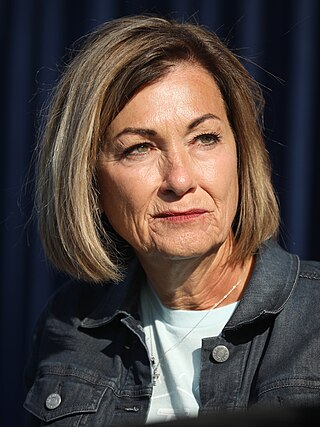
Kimberly Kay Reynolds is an American politician serving since 2017 as the 43rd governor of Iowa. A member of the Republican Party, she served as the 46th lieutenant governor of Iowa from 2011 to 2017.

Joni Kay Ernst is an American politician and former military officer serving since 2015 as the junior United States senator from Iowa. A member of the Republican Party, she previously served in the Iowa State Senate from 2011 to 2014 and as auditor of Montgomery County from 2004 to 2011. As Chair of the Senate Republican Policy Committee since 2023, after having been vice chair of the Senate Republican Conference since 2019, Ernst is the fourth-ranking Republican in the Senate.
Zada Mary Cooper was an American pharmacist and a professor of pharmacy at the University of Iowa. Cooper helped found the Women's Section of the American Pharmacists Association in 1912. She was its president in 1917. She founded the pharmacy fraternities Kappa Epsilon and Rho Chi.
The Woman's Era Club was an African-American women's civic organization founded in Boston, Massachusetts, in between 1892 and 1894 by Josephine St. Pierre Ruffin. The club was the first black women's club in Boston. The organization was especially well known for the conflict caused when Ruffin attempted to desegregate the General Federation of Women's Clubs (GFWC) in 1900.

The Iowa Federation of Colored Women's Clubs (IFCWC) was an umbrella organization serving African-American women's clubs in Iowa. The motto of IFCWC was "Sowing Seeds of Kindness", and the organization was affiliated with the National Association of Colored Women. The club produced a journal called the Iowa Colored Woman. IFCWC sent delegates to represent the state at national conventions and opportunities such as "Colored Women's day" at the 1939 New York World's Fair. The IFCWC is also known for creating a black women's dormitory for the University of Iowa before the school was fully integrated. The building has been listed on the National Register of Historic Places.
Evelyne Jobe Villines was an American disability rights advocate and political activist who had Poliomyelitis. Villines worked for both the state of Iowa and the federal government as an advocate. The Des Moines Register called her a "nationally known spokeswoman for the disabled" in 1992.

Agnes Mathilda Samuelson was an American educator and a state superintendent in public schools. She worked to provide equal education for all students in Iowa. She was posthumously inducted into the Iowa Women's Hall of Fame in 1976 and a Des Moines elementary school was named after her.
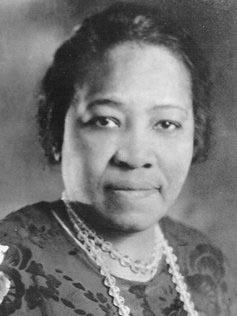
Sue M. Wilson Brown was an African-American activist for women's suffrage. She was inducted into the Iowa Women's Hall of Fame in 1995.
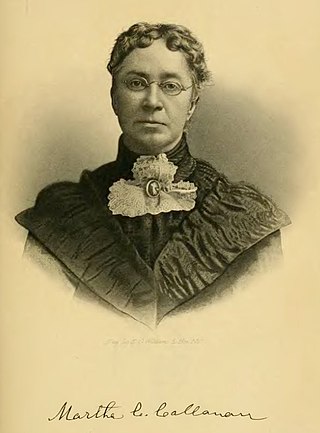
Martha Callanan (1826-1901) was a woman's suffrage advocate, newspaper publisher and philanthropist. She was born in Albany County New York and moved to Des Moines, Iowa with her husband James C. Callanan in 1863 and her home soom became the unofficial headquarters for the local women's suffrage movement.

Helen F. Johnston was an American physician and clubwoman, based in Iowa. She was president of the American Medical Women's Association from 1946 to 1947, and president of Altrusa International in 1928 and 1929.

Ione Virginia Hill Cowles was an American clubwoman and social leader. Cowles served as eighth international president of the General Federation of Women's Clubs (GFWC) from 1916 to 1918, and was then re-elected from 1918 to 1920. She preceded her executive work as head of the largest group of federated women in the U.S. by her experience gained as president of the California State Federation Women's Clubs from 1906 to 1907.

Dorothea Dutcher Buck was an American clubwoman. She was a president of the General Federation of Women's Clubs (GFWC) from 1947 to 1950.
Donald Arthur Piper is an American murderer and suspected serial killer convicted of killing two women in hotels around West Des Moines and Clive, Iowa in 1993 and 1997, but is considered a suspect in four other killings. For his confirmed crimes, Piper was convicted and sentenced to two life terms.
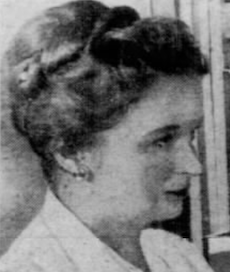
Ligia Bezumavicius Bieliukas, also written as Ligija Bieliukenė, was a member of the Lithuanian underground during World War II, and a medical technologist in New York City. She was president of the Federation of Lithuanian Women's Clubs from 1953, and three-term president of the Baltic Women's Council.
Dorothy F. Carpenter was an American politician. She was a Republican member of the Iowa House of Representatives from 1980 to 1994.
References
Citations
- 1 2 3 4 5 6 7 8 9 10 11 "Houghton, Dorothy Deemer". The Biographical Dictionary of Iowa. University of Iowa. Retrieved 8 July 2017.
- ↑ "Joan of Arc to Be Given for Furlough Home Fund". The Des Moines Register. 14 July 1918. Retrieved 9 July 2017– via Newspapers.com.
- ↑ "Of Interest to Women". The Marion Star. 28 October 1921. Retrieved 9 July 2017– via Newspapers.com.
- ↑ "Iowa Republicans Start Des Moines Convention Trek". The Daily Times. 16 July 1934. Retrieved 9 July 2017– via Newspapers.com.
- 1 2 Mason 1997, p. 1.
- 1 2 "Dorothy Deemer Houghton". International Presidents of the General Federation of Women's Clubs : 1890—2012. Retrieved 2017-07-09.
- ↑ "Federation Head Authors Reference". The Valley Independent. 25 November 1957. Retrieved 9 July 2017– via Newspapers.com.
- ↑ "Intensive Tour". Ames Daily Tribune. 10 October 1953. Retrieved 9 July 2017– via Newspapers.com.
- ↑ "NANSEN MEDAL AWARDED; Honor for Aid to Refugees Is Won by Mrs. D.D. Houghton". The New York Times. 1956-08-04. ISSN 0362-4331 . Retrieved 2017-07-09.
Sources
- Mason, Karen M. (Winter 1997). "Women's Clubs in Iowa: An Introduction". The Annals of Iowa. 56 (1): 1–11. doi: 10.17077/0003-4827.10994 . S2CID 151180009.